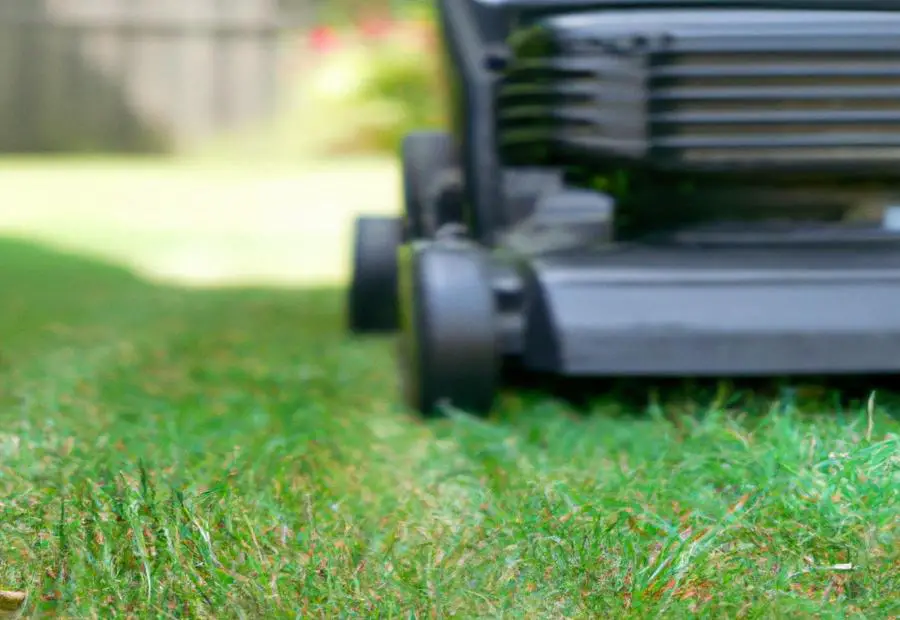GardenerHeaven.com is reader-supported. When you buy through links on our site, we may earn an affiliate commission.

Lawn mowers can be noisy, but understanding and reducing their decibel levels is crucial for a quieter yard. This article will explore the importance of noise reduction in lawn mowers. Additionally, we will uncover the purpose of this article, which is to provide valuable insights and solutions for achieving a more peaceful and serene outdoor environment.
Importance of Noise Reduction

Photo Credits: Gardenerheaven.Com by Eric Lewis
Noise reduction is very important in several places, including lawn mowing. Excessive noise is bad for people and the environment. This article will explain why noise reduction matters when mowing the lawn and offer tips to reduce noise levels.
Understanding the risks that come with loud noises is vital. Hearing loss and other hearing problems can come from exposure to high decibels for too long. Lawn mower noise can be very loud and hurt the operator and anyone nearby. It’s essential to lower the noise levels from a lawn mower.
To reduce noise, it’s important to pick the right lawn mower. Compare the noise levels of gas-powered, electric, battery-powered, reel, robot, and riding mowers. That way, you can pick one that will make the least noise.
In addition, there are things you can do to reduce noise while operating the mower. Regularly maintain the machine and use proper techniques like not using too much throttle and going at lower speeds when possible.
Also, you can buy accessories to lower the noise. Mufflers and acoustic covers are great at reducing sound.
Lowering noise is essential to protect our hearing and to live in harmony with nature. By implementing the tips in this article, you can have a quieter lawn and a calmer outdoor environment.
Purpose of the Article
This article aims to provide valuable knowledge on noise reduction regarding lawn mowers. It wants to teach readers about the different types, their noise levels, and the effects of excessive noise on hearing. It also offers tips for quieter mowing and guides readers in selecting a mower prioritizing noise reduction. The ultimate goal: is to emphasize the significance of hearing protection and motivate readers to make informed decisions in a quieter environment.
First, it discusses the diverse lawn mower types and their corresponding noise levels. It explains gas-powered, electric, battery-powered, reel, robot, and riding mowers. It allows readers to compare and understand which models may be quieter for their yards.
Second, it explores the impact of excessive noise on hearing health. It explains decibels and the possible risks of loud noises. It builds an understanding of how lawnmower noise can affect one’s hearing. It highlights the importance of stopping chronic hearing loss by avoiding prolonged exposure to high noise levels.
Third, it provides practical tips for quieter mowing sessions. It suggests regular machine maintenance to reduce noise. It also discusses proper operation techniques to optimize mowing for minimal disturbance. It introduces noise reduction accessories as options for reducing mower noise.
Fourth, it compares noise levels between various models. It evaluates decibel ratings and looks into alternatives with lower noise output than traditional models. It equips readers with information to choose a mower that meets their noise reduction needs.
Lastly, it underscores the importance of hearing protection. It encourages readers to use ear protection while mowing. It suggests other noise reduction measures. It promotes protective gear to prioritize hearing health during yard maintenance activities.
Types of Lawn Mowers and Their Noise Levels

Photo Credits: Gardenerheaven.Com by George Hill
When it comes to your yard, understanding the noise levels of different lawn mowers is essential. In this section, we’ll dive into the various types of lawn mowers and their corresponding noise levels. From gas-powered mowers to electric, battery-powered, reel, robot, and riding mowers, we’ll explore how each one affects the overall noise in your yard. So let’s explore the options and find the perfect balance between maintaining a beautiful lawn and enjoying a quieter outdoor environment.
Gas Powered Lawn Mowers
Gas-powered lawn mowers are a popular choice due to their efficiency and power. They are fueled by gasoline, which generates high levels of cutting force. And they can cover large areas without needing recharging or refueling. It’s essential to consider the noise levels and take measures to reduce it.
These mowers use an internal combustion engine. This type of mower is noisier than others. Regular maintenance and care are necessary. It helps to use proper operation techniques and noise reduction accessories to reduce the noise. A quieter alternative, such as an electric or battery-powered mower, should be considered.
Excessive noise levels can cause chronic hearing loss. To prevent this, it’s essential to understand decibel measurements and take precautions when operating gas-powered lawn mowers. To mitigate the noise impact, regular machine maintenance is needed. This includes checking and replacing worn-out components and reducing the engine throttle speed. Noise reduction accessories like sound-dampening covers and ear defenders can also help reduce sound exposure.
Electric Lawn Mowers
Electric lawn mowers are an excellent option for those wanting a quieter mowing experience than gas-powered mowers. They come in different models and designs, such as corded and rechargeable battery-powered versions. Plus, they’re environmentally friendly since they don’t produce harmful emissions. So, go electric, and you’ll benefit from a reduction in noise and pollution!
Did you know that gas-powered mowers can generate up to 95 decibels (dB) of noise, while electric models are typically between 70 and 75 dB?
Battery Powered Mowers
Battery-powered mowers are an excellent choice for those looking for a quieter lawn care experience. They operate using rechargeable batteries, rather than gasoline or electricity from a power outlet, and emit lower decibel levels than gas-powered mowers.
These mowers also produce less vibration, making the mowing experience more pleasant. Plus, modern battery technology can deliver performance comparable to gas-powered mowers without noise and air pollution.
The convenience of cordless operation is a huge bonus, allowing for greater flexibility in lawn care routines. Additionally, battery-powered mowers are considered more environmentally friendly since they do not emit harmful emissions or contribute to fuel consumption and dependence on fossil fuels.
However, there may be limitations regarding cutting power and runtime compared to gas-powered models. Fortunately, many manufacturers are actively working to improve battery technology to address these concerns.
So, if you’re after a quieter mowing option, battery-powered mowers are the silent ninjas of lawn care: cutting grass and eardrums with precision.
Reel Mowers
Beep beep, the robots are here to mow your lawn and take over the world silently! Reel mowers provide a quieter alternative for lawn maintenance than other types. They have cylindrical blades that spin vertically to cut the grass without gas or electricity. And they make minimal noise levels! Plus, they are human-powered, so no emissions are created.
Additionally, they produce a clean cut which helps the turf grow healthily. Reel mowers are great for those who want a peaceful lawn-mowing experience. They offer the benefit of reducing noise without sacrificing quality. So, get your robotic reel mower to enjoy a quiet yard and conquer the world!
Robot Mowers
Robot Mowers have transformed the landscaping industry! Their autonomous operation and intricate cutting mechanisms provide convenience and less noise pollution.
No more manual labor or hours spent pushing a mower. Plus, they are often battery-powered, making them an eco-friendly alternative to gas-powered mowers.
Robot Mowers first appeared in the mid-1990s, but they were large and expensive, so only commercial entities and wealthy individuals could benefit.
Over time, technology and miniaturization led to more affordable and compact Robot Mowers. Now, homeowners can enjoy these innovative lawn mowers’ convenience and noise reduction.
Before investing in a Robot Mower, it’s essential to consider factors like lawn size, terrain complexity, and cost.
Riding Lawn Mowers
Riding lawn mowers is fantastic for large yards! Though they usually make more noise than other mowers, there are ways to reduce it, such as keeping engines and parts up-to-date and using noise-reducing accessories. Electric or battery-powered riding lawn mowers make an excellent choice for quieter mowing.
Impact of Noise Levels on Hearing

Photo Credits: Gardenerheaven.Com by Anthony Mitchell
Excessive noise levels can have a significant impact on our hearing. In this section, we’ll dive into the correlation between noise levels and our auditory health. We’ll explore the concept of decibels and how they relate to sound intensity. Additionally, we’ll shed light on the potential health risks associated with exposure to loud noises. Furthermore, we’ll examine the specific effects that the noise generated by a lawn mower can have on our hearing. Lastly, we’ll discuss preventive measures to help safeguard against chronic hearing loss.
Understanding Decibels
Decibels, or dB, measure the intensity or volume of sound. Knowing this is vital for assessing the possible damage of loud noises to our hearing. The reference data outlines which lawn mowers produce various noise levels. It also shows the risks of excessive noise exposure, such as chronic hearing loss.
Comparing decibel levels is key when buying a lawn mower. Tips like quieter mowing techniques and upkeep are available to reduce noise during operation.
Understanding decibel measurements matters regarding hearing health. People can make informed choices about quieter models or noise-reduction accessories. Loud sounds may be pleasant, but they can be harmful. So, understanding decibels is essential when considering the impact of lawn mower noise.
Health Risks of Loud Noises
Noise levels can cause severe issues for health. High noise can lead to hearing loss, primarily a problem with lawn mowers. The dB sound level, which can potentially cause hearing loss, is 85. Gas-powered mowers usually create the highest noise levels. Prolonged exposure to this volume of sound can harm the inner ear.
To protect hearing, it’s essential to:
- Wear ear protection when around or operating a lawn mower
- Take steps to reduce overall noise in the yard
- Regularly maintain the machine
- Use accessories like mufflers and insulation materials to reduce sound vibrations.
When buying a lawn mower, choose a model with lower decibels. Electric or battery-powered mowers or reel mowers are quieter options. Even when using these, wear ear protection. Don’t risk your hearing with loud mowers – protect it!
Effect of Lawn Mower Noise on Hearing
Lawn mower noise can have a significant impact on hearing. It can lead to long-term damage if not taken care of. High decibel levels harm hearing health. Gas-powered lawn mowers can make too much noise and damage the delicate structures in the ear. Knowing about decibels is essential to avoid chronic hearing loss.
Regular exposure to loud noises, like lawn mowers, causes chronic hearing loss. It’s permanent and cannot be reversed. Research different models to compare noise levels to protect hearing and reduce lawn mower noise. Electric and battery-powered mowers are quieter than gas-powered ones. Reel mowers and robot mowers are also known for quieter operations.
To further protect hearing, use ear protection such as earplugs or earmuffs. Also, maintain distance from the source of loud noises. Use barriers around the yard if possible. Keep blades sharp and adjust the engine. Avoid high throttle settings and reduce operating time. All these steps help make a quieter mowing experience.
Chronic Hearing Loss Prevention
Noise-induced hearing loss is an alarming matter that requires prevention. Taking proactive steps is essential for guarding against chronic hearing loss. Lawn mowers and other loud noises can damage our hearing health. It’s thus vital to know decibel levels and their associated risks.
To protect hearing, it’s essential to select a quiet lawn mower and take proper precautions while operating it. Keeping the machine in good condition will reduce noise levels. Additionally, consistent speed and avoiding sudden starts/stops will minimize excessive noise.
Noise reduction accessories are available for lawn mowers. These include blade shrouds/covers, mufflers/silencers, and vibration-dampening pads. These can reduce noise levels and lead to a quieter mowing experience.
Other than picking a quiet lawn mower, it’s important to prioritize personal protection. Ear protection like earmuffs/earplugs can significantly reduce hearing damage from lawn mower noise. Always use these devices when operating a lawn mower or being exposed to loud noises.
For further noise reduction, consider other factors like mowing at appropriate times or taking regular breaks during long mowing sessions.
Individuals can protect their hearing health and enjoy their lawns by understanding the importance of chronic hearing loss prevention and taking measures like machine maintenance, proper operation techniques, noise reduction accessories, and ear protection.
Tips for Quieter Mowing

Photo Credits: Gardenerheaven.Com by Bobby Perez
Maintaining a quieter yard while mowing can significantly impact your daily life. This section will explore some practical tips to achieve a quieter mowing experience. We’ve got you covered from regular machine maintenance to proper operation techniques and noise reduction accessories. Discover how a few simple adjustments can help you enjoy a more peaceful mowing session without compromising the quality of your lawn.
Regular Machine Maintenance
To keep your lawn mower running optimally, regular maintenance is key. Doing this will stop issues and keep it working smoothly during the mowing season.
- Cleaning: Use a brush or cloth to clean the blades, deck, and other parts. This stops clogs and ensures good airflow.
- Oil Changes: Change the oil for your specific model per the manufacturer’s instructions.
- Blade Sharpening: Check mower blades regularly and sharpen them with a file or grinder. This improves cutting and reduces noise.
Check spark plugs, air filters, belts, and tires periodically too. Fixing any wear-and-tear early saves money.
Maintain your machine for quieter mowing and a nice-looking yard. Mow like a pro!
Proper Operation Techniques
Tame the beastly symphony of your lawn mower with proper operation techniques!
Follow these four steps for a quieter mowing experience:
- Pick the right time: Mow during quieter hours, such as weekdays or mornings, to minimize noise disturbance to your surroundings.
- Keep a steady speed: Avoid sudden acceleration or deceleration to reduce sharp fluctuations in noise levels.
- Set the right cutting height: Adjust the cutting height to the recommended level for optimal noise production.
- Sharpen blades regularly: Sharpen blades for cleaner cuts and less noise.
Furthermore, opt for quieter mower types, like electric or battery-powered mowers, to further reduce noise levels.
These steps are key to minimizing immediate disturbance and potential long-term hearing health risks associated with excessive noise exposure. Enjoy peaceful outdoor moments without compromising on a well-maintained lawn!
Noise Reduction Accessories
Noise Reduction Accessories come in three categories:
- Mufflers and exhausts made for gas-powered mowers reduce engine noise. These dampen the sound for a quieter operation.
- Blade covers, or housing dampeners, cut the noise of electric and battery-powered mowers. They act as insulators, stopping vibrations from making too much noise.
- Lastly, vibration isolators or shock-absorbing pads cushion the lawn mower and its contact surface. They absorb vibrations, reducing noise through contact with the ground or other surfaces.
Remember to choose Accessories that match specific mower brands and models for the best performance. Regular maintenance is essential, too, to keep the noise down.
Silence is golden. Get a lawn mower that won’t blow your ears away.
Choosing the Right Lawn Mower for Noise Reduction

Photo Credits: Gardenerheaven.Com by Randy Brown
Reduce the noise in your yard by choosing the right lawn mower. In this section, we’ll compare the noise levels of different mowers and explore quieter alternatives for a more peaceful outdoor experience.
Comparing Noise Levels
Noise levels vary a lot between different types of lawn mowers. To pick the right one for a quieter yard, comparing the noise levels is essential. Gas-powered mowers tend to be louder than electric mowers. Battery-powered mowers offer a quieter choice. And, Manual reel mowers also operate at lower noise levels. The noise levels of robots and riding mowers depend on their engine type and design.
To compare the noise levels of different lawn mowers, make a table. This should include gas, electric, battery, reel, robot, and riding mower columns. Fill in the decibels (dB) for each type, so readers can easily see the loudest.
But there are other factors to consider too. Accessories like mufflers or dampeners can reduce mower noise. Regular maintenance and proper operation help too.
High noise levels from lawn mowers may cause hearing loss if we don’t take precautions. So, selecting a lawn mower with lower noise emissions is essential. Also, use hearing protection to maintain good hearing health.
Quieter Alternatives
Discover Quieter Alternatives to traditional gas-powered lawn mowers to reduce noise pollution and upgrade your outdoor experience!
Electric and battery-powered mowers are great for small to medium-sized yards. They are quieter than gas-powered models and also provide eco-friendly benefits. Robot mowers can be set up to operate autonomously, allowing you to relax while the machine takes care of the lawn work. Reel mowers don’t have any motor, making them one of the quietest options available. Some riding lawn mowers also come with noise-reduction features such as insulated engine compartments or quieter engine designs.
Quieter Alternatives offer a range of options to suit all needs. Select the perfect fit for your lawn size, preferences, and noise reduction requirements. By choosing Quieter Alternatives, you can achieve a well-maintained yard without compromising on performance or creating too much noise.
Importance of Hearing Protection

Photo Credits: Gardenerheaven.Com by Billy Robinson
Noise levels from lawn mowers can harm our hearing if proper precautions are not taken. In this section, we will delve into the importance of hearing protection and explore ways to mitigate the impact of loud noise on our ears. Discover the benefits of using ear protection and other effective noise reduction measures to ensure a quieter yard without compromising the health of our hearing.
Using Ear Protection
Ear protection is a must for safeguarding hearing in noisy environments. It requires specialized gear to reduce the effect of loud noises on ears. When using a lawn mower, ear protection is essential to lessen the risk of hearing damage from long-term exposure to high decibel levels.
Follow these steps to use ear protection efficiently when operating a lawn mower:
- Choose the right gear: Pick suitable ear protection for optimal noise decrease. Options include earmuffs and earplugs. Ensure whatever is chosen fits securely, creating a barrier between ears and loud noises. It must offer enough noise reduction and feel comfortable.
- Please put it on properly: After selecting the right gear, it must be worn correctly to be effective. Earmuffs need to cover ears and make a seal ultimately. Earplugs must fit fully into the ear canal. Follow manufacturer instructions for proper usage.
- Maintain and replace when needed: Regular maintenance of ear protection is necessary for continued effectiveness. Inspect earmuffs for any signs of wear or damage and replace if needed. Disposable earplugs should be changed after each use or according to manufacturer recommendations.
Using ear protection while operating a lawn mower helps reduce the risk of hearing damage due to long-term contact with high decibel levels. By picking and wearing suitable gear properly, users can minimize their vulnerability to dangerous noise levels while doing yard maintenance activities.
Remember that proper selection and maintenance are vital to get the best results when using protective gear for your ears while operating lawn mowers or other noisy equipment.
Other Noise Reduction Measures
To reduce noise from lawn mowers, regular maintenance, and proper operation are critical. Noise-reduction accessories, like mufflers and silencers, can also help. Furthermore, installing sound barriers or acoustic fencing around the area can absorb and reduce noise.
Scheduling lawn mowing times when noise is less likely to be a nuisance is also a great idea. Avoiding early mornings or late evenings is best, as people may sleep or do quiet activities.
Electric and battery-powered lawn mowers tend to produce less noise than gas-powered ones. Therefore, using these alternatives can make a big difference.
In one suburban area, residents complained about lawn mower noise. The local government created an awareness campaign to promote noise reduction measures. After this, people became more conscious of noise levels, leading to a decrease in disturbances.
Conclusion

Photo Credits: Gardenerheaven.Com by Eugene Miller
Lawn mower noise levels differ depending on the model. Being mindful of decibels is key for a quieter yard. Homeowners should select lower decibel-rated mowers to reduce sound. Acoustically designed blades and sound-dampening decks can help too. Taking these steps leads to a calmer outdoor setting. It’s important to consider noise levels and take action for a peaceful and pleasant backyard.
Some Facts About Lawn Mower Decibels Explained – Understanding Noise Levels for a Quieter Yard:
- ✅ Riding lawn mowers can produce noise levels ranging from 80 to 100 decibels. (Source: Team Research)
- ✅ Regular maintenance, such as tightening bolts and screws, using a quieter muffler, and wearing ear protection, can help reduce the noise of a lawn mower. (Source: Team Research)
- ✅ Gas lawn mowers typically produce around 85 decibels when running at full power. (Source: Team Research)
- ✅ Electric lawn mowers are quieter than gas mowers, but still over the 70 decibel threshold where hearing loss can occur with prolonged exposure. (Source: Team Research)
- ✅ Riding mowers and electric mowers typically produce around 95 decibels of noise, which can be damaging to hearing. (Source: Team Research)
FAQs about Lawn Mower Decibels Explained
How loud is a lawn mower, and what factors affect its noise level?
Lawnmowers can produce varying noise levels, ranging from 80 to 100 decibels. The model, engine size, and machine age can influence the noise level. Gasoline-powered mowers tend to be louder than electric mowers. Additionally, poorly maintained mowers may be louder due to loose bolts and screws or an old muffler.
What is the safe noise level for operating a lawn mower?
The safe noise level for prolonged exposure is typically below 85 decibels. Protecting your ears from loud noises when using a lawn mower is important to prevent hearing loss. Wearing ear protection, such as foam earplugs, canal caps, or earmuffs, can help reduce the risk of damage to your hearing.
Which type of lawn mower is the quietest?
Electric lawn mowers are generally quieter compared to gasoline mowers and riding mowers. Electric mowers produce around 75 decibels of noise, making them a quieter option for maintaining your yard. Robot mowers are also considered the quietest type of lawn mower available.
How can I reduce the noise level of my gas-powered lawn mower?
To lower the noise level of a gas mower, you can take several maintenance steps. These include tightening bolts and screws, using a quieter muffler model, and ensuring the deck belt is tight. Regularly maintaining the mower and sharpening the blades can also help reduce noise.
Is the age of the lawn mower a factor in its noise level?
Yes, the age of the machine can contribute to the noise level it produces. Older gas-powered or larger riding mowers may be louder due to mechanical vibrations and wear and tear on the engine and parts. Consider potentially switching to a newer model or a battery-operated mower to reduce noise.
Are electric lawn mowers a quieter alternative to gas-powered mowers?
Yes, electric lawn mowers are generally quieter compared to gas-powered mowers. They produce around 75 decibels, lower than the noise level that can cause hearing damage. Electric mowers are becoming more popular due to their lower noise levels and environmentally friendly operation.




